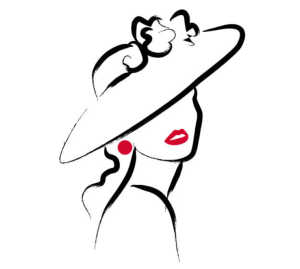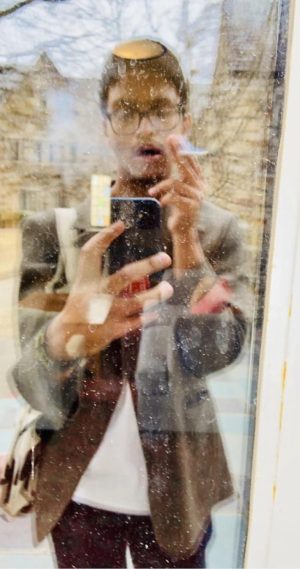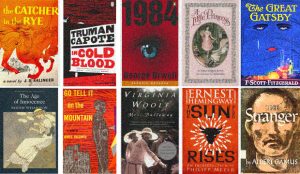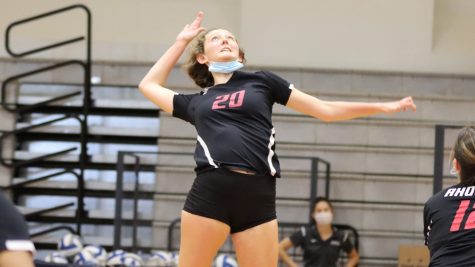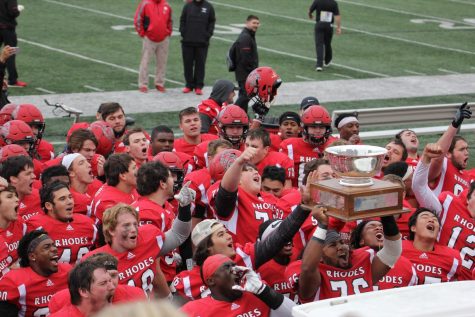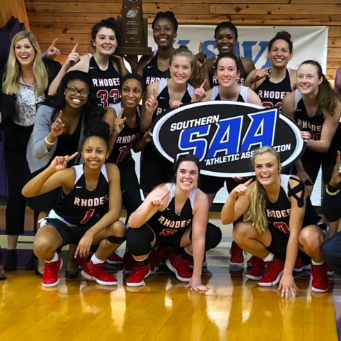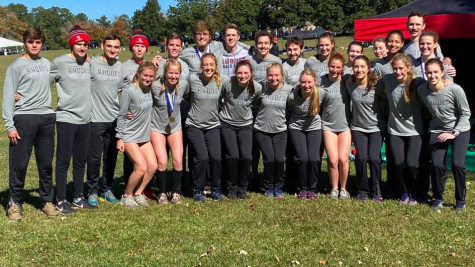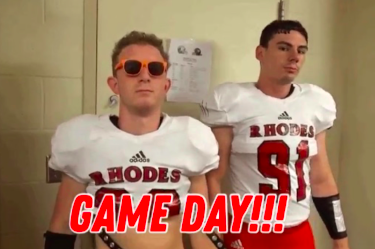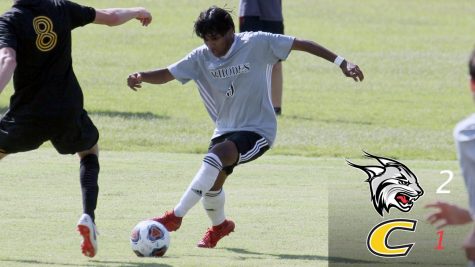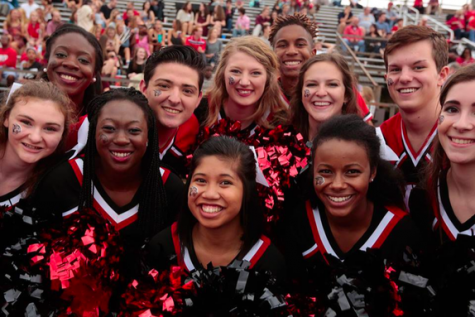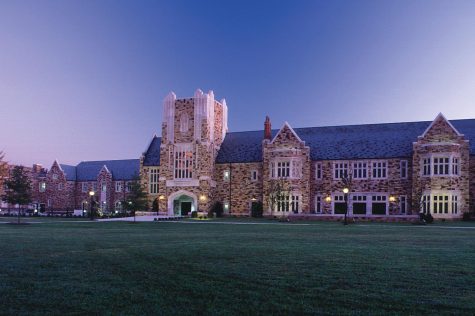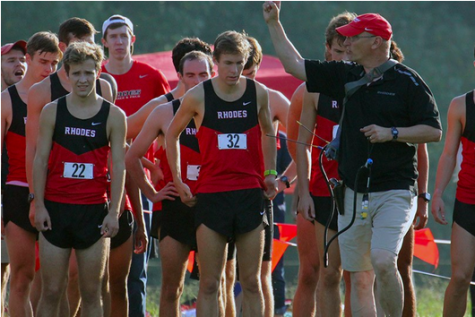Sitting down with ‘Can’t Knock the Hustle’ co-hosts
The unabridged interview
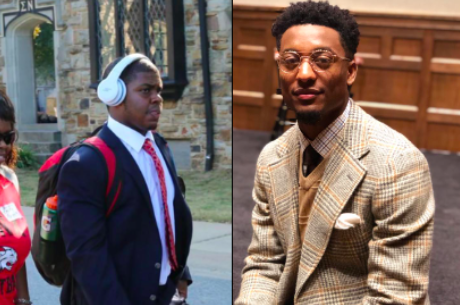
Bryce Hayes, left, and PJ Settles, right.
October 4, 2018
This month, Staff Writer Adrian Harris ‘20 sat down with PJ Settles ‘19 and Bryce Hayes ‘20, both History majors, football players and co-hosts of the sports and culture podcast Can’t Knock the Hustle. What follows is a transcript of their conversation with minimal edits for clarity.
PJ Settles: Bryce texted me summer before sophomore year and he asked me, “Hey, if you want, I’m willing to start up a podcast outlining all the sports talks and music debates we have in the Rat.” At dinner, we always have these discussions that are two or three hours long. I was like, “You know what, we do it anyways, so why not?” We did the first show and enjoyed it, so the rest is history.
Bryce Hayes: It started with Dean [Meredith] Davis. She said, “Bryce, you love sports so much, you need to do something on this campus, because there’s nothing here for that. Everyone talks about politics and this that and the other, but nobody talks about sports.” … Coach Booker, who is the Wide Receivers coach, and Coach Wagner, the softball coach, they both came and said it would be a great idea. I texted PJ, who was all in for it…[and] we started when we got back at camp that year. Campus support has been amazing.
Adrian Harris: Do yall wanna dive into what actually gets talked about on “Can’t Knock the Hustle?” What’s the overarching theme of the show?
Settles: It’s a show dedicated to talking about sports and music. That’s the general overview. But we also dive in to a lot of social issues…obviously, with sports, you can get every topic covered if you dig deep enough. We talk about the pressing issues of the day – whatever they’re talking about on ESPN or “First Take.”…anything, we’re talking about it. And even some stuff that they’re not. We have a lot of culture debates, talking about top five rappers or some fun topics that everyone likes to debate. But we also get into some heavier issues. Bryce, you can talk more about some of the stuff we got into last year.
Hayes: Well, one of our taglines has been Pushing the Culture Forward. There’s a lot of stuff on this campus that doesn’t get talked about because we are so focused on doing schoolwork. I just felt like we needed to provide a space, kind of like the barbershop, where we could talk about whatever we feel like talking about, whether it be the Michigan State case, or Colin Kaepernick taking a knee…whatever we feel like needs to be talked about, we just turn the mic on and go out there.
Harris: Do you think the impact that the show has had on campus is substantial enough to essentially transcend itself? Do you think it can be bigger than it is now?
Settles: Personally, I think so. With Bryce’s vision for it initially, it was – let’s give D3 athletes this space to flourish, to highlight D3 athletes. You see, because the D1 school has their…
Hayes: They have “SportsCenter.” No one covers D3 athletes, because we’re not as important. That’s why we only did a Rhodes Report [segment]. That’s the closest to “SportsCenter” that we’re gonna get. Everything we do is just as important as what the D1 kids are doing. So the Rhodes Report is going over whatever happened in the last week, whether it be soccer, field hockey, basketball, baseball…doesn’t matter. We’re all important. We’re one family.
Settles: If that blows up enough to where Rhodes is getting highlighted to its fullest potential—and so far we’re covering a lot of ground with highlighting all sports, and athletes and players of the week—I think with that continuing to rise and getting the full Rhodes athletics behind it, I think eventually it could blow up to more D3 schools in the conference or in the area. With me and Bryce, it’s my last year…I don’t know where it’s going to go. I want to make sure at the end of the day we keep our creative control. Some of the stuff we talk about can be touchy subjects, and I don’t want to down anyone’s views, but I feel like the perspectives we’re giving aren’t just as a Black man, as an athlete. We try to give different perspectives. This year we added six people to our staff. Cody Stockton [‘19] pretty much comes in and talks about some of our more political subjects. I know every time Donald Trump has something to say about athletes, Cody comes in the next week. Duke Sherrell [‘19] is our NBA analyst. DJ Coker [‘19] is over our marketing.
Harris: From the names you’ve listed, I noticed that there’s a focus on bringing in the Black community, having them be involved.
Hayes: Without a doubt.
Harris: Do you have ideas for expanding it to the greater Memphis community?
Settles: I know Bryce has talked to the Grizzlies. We are possibly trying to get on the radio, and there are some talks about expanding. Right now, we’re just trying to put our full footprint on Rhodes College, and then once everyone on this campus knows who we are, we can start expanding. We can move throughout Memphis, then hopefully the Mid South.
Hayes: That’s the funny thing because you’re the quarterback, you know, everybody knows you. People talk about the show to me, not realizing it was me.
Harris: Are you okay with that? You like being lowkey?
Hayes: Yeah, I mean, it is what it is. We’re making progress everyday that we do this.
Harris: Would you rather be known for the show or as a football player on the Rhodes campus?
Hayes: My brand is bigger than football. I’ve come to terms with that. It used to be in high school I was just “Bryce, the football player”, and now I’m working with the softball team, I’m doing “Can’t Knock the Hustle,” I’m working in the Athletic Department as the RSAP…It’s just, I’m doing so much on this campus now, that it just doesn’t matter at this point.
Harris: This question is for PJ. You’re about to graduate, right?
Settles: Hopefully. [Laughs]
Harris: What will Can’t Knock the Hustle be for you post-matriculation?
Settles: That’s a great question. I would say…first off, it depends on what I decide to do when I graduate. One thing that I may try to do, whether it be right after I graduate or later on, is go into sports journalism, and “Can’t Knock the Hustle” ties directly obviously into that. So, it’s something Bryce and I will have to talk about. Once I do graduate, if we want someone else to step on or…or whatever. That’s all up to him.
Harris: And then Bryce, for you—what do you see yourself doing?
Hayes: This is just a launchpad man. Hopefully, get a job with Grind City Media or the Grizzlies, wherever it takes me. I mean, sports is my passion.
Harris: Quick digression…the hip hop community recently lost Mac Miller.
Hayes: That was the first 15 minutes of the show last week.
Harris: Ya’ll wanna talk about how much music has influenced this show as it works in tandem with the sports?
Hayes: We start every show at least with one song, whether it be a throwback or one hot song on the radio, just to set the tone, and then every episode we have something called the Culture Corner, where we try to introduce our audience, especially Rhodes students, to something, whether it be old school hip hop or R&B.
Settles: When you look at American society, it’s driven by black culture. Most of the music on there is what we talk about…you have sports entertainment, and a lot of the stars mingle. There’s a lot of sports topics covered in hip hop. It’s just all about the culture. What drives mainstream culture, what we see on Twitter, on TV…it’s sports and hip hop. So, that’s what we talk about. You’ve got some hot topics in there, a lot of hot takes, a lot of laughs, a lot of arguments. It’s a lot of fun.
Hayes: A lot of love in there.
Settles: Oh yeah, definitely. It’s a lot of crossover, but it’s all relevant.
Hayes: You guys are mentioning that the energy on the show is great, and it’s all about love and growth and empowerment, for the culture specifically. I know when you get in the field of politics it can become much more heated, and the tension can rise. How did you guys manage the current political climate with the sports and being students at Rhodes College? It’s a very diverse political field…you have toes that are going to be stepped on. How do you manage that?
Settles: I feel like one thing we do well is that we always acknowledge that there is a subject that’s coming up that could get heated, and then, I think we do a good job of bringing people on who actually know what they’re talking about. So, last year we had Dr. McKinney on the show…
Harris: So school faculty is very much involved.
Settles: Yeah they are. We have people come on who are experts in the field of talking about what the topics are. And then when we’re addressing the topics themselves we always…
Hayes: We’re just ourselves. We’re not going to try to throw anyone under the bus, no name-calling. We’re going to critically analyze each situation and just tell the truth. Our truth.
Harris: Have you guys had or plan on having President Hass to sit on the show?
Hayes: Like I’ve said, the door’s always open.
Settles: It’s just a matter of reaching out, at this point. If she’s willing to come on…
Hayes: We will welcome her with open arms. At this rate, not to be cocky, but I don’t think anyone is too big for me to talk to. We’re just having a conversation, talking about things we know a lot about.



